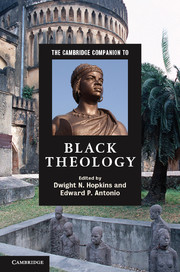Book contents
- Frontmatter
- Part I Introduction
- Part II Themes in black theology
- Part III Global expressions of black theology
- 16 The history of black theology in South Africa
- 17 Black theology in Britain
- 18 Slave religion and black theology in Brazil
- 19 Black theology in Cuba
- 20 Black theology in Jamaica
- 21 Methodology in an Aboriginal theology
- 22 Black theology and postcolonial discourse
- 23 The future of black theology
- Further reading
- Index
- Other titles in the series
23 - The future of black theology
from Part III - Global expressions of black theology
Published online by Cambridge University Press: 28 September 2012
- Frontmatter
- Part I Introduction
- Part II Themes in black theology
- Part III Global expressions of black theology
- 16 The history of black theology in South Africa
- 17 Black theology in Britain
- 18 Slave religion and black theology in Brazil
- 19 Black theology in Cuba
- 20 Black theology in Jamaica
- 21 Methodology in an Aboriginal theology
- 22 Black theology and postcolonial discourse
- 23 The future of black theology
- Further reading
- Index
- Other titles in the series
Summary
INTRODUCTION
In the late 1960s, black theology was the answer to some of the critical questions of the age. Chief among these were: Can I be authentically black and Christian at the same time? Does the Gospel have anything to say to those who are struggling against racial oppression? How is Christianity as practiced historically by the oppressors any different from that practiced by their victims? These and similar questions focused the conversations among early black theologians. As we look back on those years, the works produced strike us in two distinctly different ways. First, those texts can appear to be somewhat rough and unpolished when seen through the lens of more than forty years of the refining fire of debate, conversation, and research. At the same time, these works continue to convey the urgency, passion, and commitment of their authors. There is nothing dispassionate about these texts. They are written as if the very future of the Gospel and the race were at stake. In a sense, they were. At the time, the United States and its allies were engaged in a never-to-be-won war in Southeast Asia; the nation was still reeling from a decade of public assassinations and secret wars on various political resistance movements. The mainline churches were just beginning their slow decline and right-wing Christian groups were about to awaken from a cultural slumber. Black theology addressed questions of power, race, and justice because these were exactly the issues and problems with which black people were dealing.
- Type
- Chapter
- Information
- The Cambridge Companion to Black Theology , pp. 309 - 322Publisher: Cambridge University PressPrint publication year: 2012



